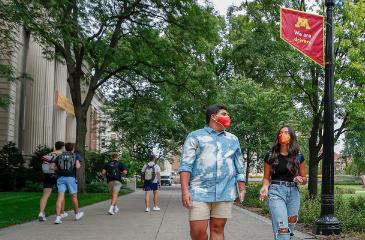As another academic year approaches, I would like to extend a warm welcome. Whether you're new to the health sciences this fall or returning, I hope you’ll share in our commitment to working together across disciplines and silos.
COVID has reshuffled our thinking about how people work in teams, and it’s been incredible to see people come together and adapt quickly to new circumstances. Teamwork is critical to providing the best health care, education, and research.
As a reminder, masks are still required for health sciences buildings in which our faculty, staff, students and volunteers may have potential interactions with patients and research participants. The buildings affected by these requirements are:
- Center for Magnetic Resonance Research: elevators, common areas, and clinic space
- Moos Tower: elevators; floors 2, 3, 4 (preclinic area) and 6-9 (dental clinics)
- Phillips-Wangensteen Building: elevators; floors 1-3 and 9 (eye clinic)
- Weaver-Densford Hall: floor 2
- 717 Delaware: elevators, lobby, floor 2 common spaces, and clinics
Please see the latest Campus Public Health Officer message for more information on recommendations and University policy.
We continue to develop how best to collaborate in teams, but one thing is certain, we need every one of us to truly go far. What are new ways we can collaborate this year?
Driving Innovation & Discovery
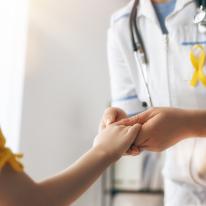
Advance Care Planning for Adolescents with Cancer
In a recently published study in the Journal of the American Medical Association, University researchers and colleagues say adolescents with cancer deserve a voice in medical decisions made for and about them. This longitudinal adolescent advance care planning study is the largest study to date of the validated Family-Centered Advance Care Planning intervention for Teens with Cancer, which provides adolescents with cancer and their families the opportunity to have challenging conversations about difficult subjects with a conversation guided by a trained interventionist.
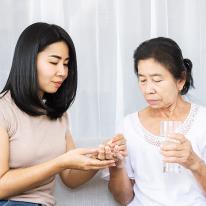
A New Approach Using Lessons Learned from Older Adults who are Successfully Managing their Medications
The unfortunate and unintended consequences of medications, known as drug-related morbidity and mortality, has been estimated to cost the U.S. $528 billion annually. Fortunately, collaborations among patient support groups, person and family engagement organizations, and health care professionals are providing a new approach to helping individuals make sense out of a seemingly complex and uncoordinated medication use system.

Apply for the Wallin Neuroscience Discovery Fund
The purpose of the fund is to provide support for early-stage ideas and creative, pioneering projects in neuroscience that otherwise may go unfunded by conventional grant-making bodies. The ultimate goal is that such proposals will lead to new or continued funding through the National Institutes of Health, National Science Foundation or other federal/national agencies. LOIs due Sept. 1.
Advancing Interprofessional Education & Training
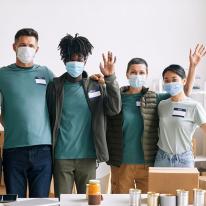
Minnesota Future Together Grants Support Training for High-Need Careers
Students pursuing a degree in a U of M health care program may be eligible to receive a Minnesota Future Together Grant, which is a program offering tuition-free pathways for students in high-need career areas. The grants are made possible through an investment by Governor Tim Walz with the federal American Recovery Plan funds.
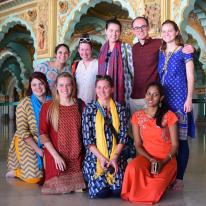
Learn about Global Health in India
The application is now open for the two-week course India: Global Health, Globalization & Leadership. Join a dynamic, interdisciplinary group of learners in Mysore, India during the U’s winter break to explore health, health care delivery, and social determinants in the context of globalization in the country. Open to graduate and professional students for credit (GHSR 6715, 3 cr.) and U of M alumni and community learners for non-credit enrollment. A virtual information session will be held Sept. 14.
Partnering with Communities
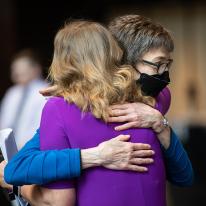
The Caring for People with Memory Loss Conference Provides a Supportive Space for Families and Researchers
The annual Caring for People with Memory Loss Conference, hosted by the School of Public Health and sponsored by the Minnesota Northstar Geriatrics Workforce Enhancement Program, provides an opportunity to engage with experts in a lively, informative discussion related to memory loss, caregiving tips, and what you can do to help. This year’s event included 291 attendees, with many family members, including the parent or spouse suffering from memory loss and health professionals coming together to discuss dementia.
U-Wide Events and Opportunities

Call for Nominations: Academies for Excellence
Faculty nominations are now being accepted for the Academies for Excellence, which recognize our most distinguished health scientists and educators. Nominations are open to all U of M faculty. Deadline for submission is Oct. 10. If you have any questions or would like more information please contact [email protected].

Health Sciences' Student Food Drive
To address the struggle with food insecurity amongst health professional students, the health sciences are collaborating on a network of Care Corners that serve as "take what you need" food pantries. Care Corners are located in various locations across the health sciences. Donations of unexpired, shelf stable items are being accepted now through Sept. 30.

Ecosystem Health Mini Grants Applications Due Sept. 15
These Institute on the Environment Mini Grants support projects aimed at developing student competencies for Ecosystem Health and related frameworks. Open to all interested educators, even those with limited experience in the focal area. These grants of up to $3,000 may be used for projects that catalyze creative ESH curricular or co-curricular projects that fill gaps in existing undergraduate education across the U of M five-campus system.
